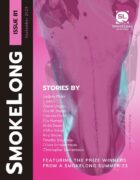Let’s start with the title which plays a significant role in the timeline of the story. Did you choose the flower “Neelakurinji” because of a personal association, a memory, or the cycle of its blooming?
Can I say all of the above? The song “Idhazhin Oram” (banger) has a line in it that references kurinji. It goes something like, “Tell me you love me. You’re my kurinji. What I feel for you is true.” A flower that blooms every twelve years is incontestably romantic. I get why people write songs about it. However, it has me wondering if the opposite is true. If a flower that blooms every twelve years can be representative of a love that is hollow and only worthwhile in momentariness. I guess I have Radio Mirchi to thank for the idea. It is also fairly on-brand for me to take a beautiful thing and examine it under heinous lighting.
In the story, the family cremates the missing mother after six months. In other cases, people keep waiting endlessly for their loved ones, clinging to the hope that they might return one day. What made you lean towards the direction you took?
I knew I wanted to write a story about signs and grief, which ended up working pretty neatly for me because looking for signs is a process of creating knots out of grief. It is saying, “I accept your disappearance, and I reject it.” It is making ashes out of burnt petals, sleeping in flower beds, inventing shapes in the sky. For me, it is the ultimate clinging to hope. I also wanted to write a story that transmogrifies its own themes–-like the arc of return shifting from mother to daughter. Homecoming is my lighthouse. I am interested in how we are altered by departure, and how we can arrive somewhere over and over and over again. In that sense, the direction of this story has always been inevitable.
“Later that night, I called Achan because he’d stopped calling me.” This line carries a lot of weight a story. I love such simple and perfect sentences. Did it come to you early in the drafting stage or did it evolve after a few iterations?
Thank you for reading so closely! To me, writing flash feels like you’re wrestling a universe into a cabin bag. It’s a lot of grunting and sweating, trying to bundle up the subtext. If my sentences appear composed, it’s because we’ve been fighting behind the scenes. I’m also a micromanager. I treat first drafts like final versions. I remember tinkering with the ending a few times but leaving the rest of the story unchanged. Usually, my editing process involves hair-pulling, nitpicking, teeth-grinding, nail-biting, brow-furrowing, and migraine-inducing screen time. Once in a while, I get lucky and only have to deploy four of those things.
This story has numerous threads, layers, and endless possibilities. You could have easily expanded it into a longer work. Why did you choose to write the story in flash format?
I write until the sentences stop diverging in my head. Sometimes this is a long and excruciating process, and sometimes it’s all over very quickly. My stories are autocratic in the way they present themselves. I don’t call the shots.
I love the use of Tamil phrases, “Piranthanal varthukkal” and “chinna athisayam,” in the story. Was that a conscious decision or did you go with the flow? At any point, did you think of replacing the phrases with their English translations? (I’m happy you didn’t.)
I remember feeling very conflicted about this a few years ago because many people have many opinions about what’s considered “authentic” when it comes to writing in two languages. I grew up in Madras. I speak Tamil at home, with my parents and grandparents, though I am nowhere close to fluent. Som-Mai Nguyen’s essay Blunt-Force Ethnic Credibility presents an interesting argument about diaspora writers and how they use non-English words to assert unearned authority. At the time, I remember thinking “Yes!” because I believed not being a diaspora writer liberated me from this critique. But the whole business of Indian English is a tricky one. I don’t even mean the chutnification of it necessarily, or a specific decolonized English that performs the dual role of acting as a sort of political herald whilst also meeting the abstruse criteria of mainstream publishing, but more so this idea that no matter how you write, there will always be someone (my mother) who reads it and says, “Well, if this character speaks Tamil in this scene, logically, they should also speak Tamil in this other scene.” So, to answer your question, I make choices about language the way I make choices about ostensibly anything else in my life, with some degree of certainty and some degree of imposter syndrome.



 The core workshop of SmokeLong Fitness is all in writing, so you can take part from anywhere at anytime. We are excited about creating a supportive, consistent and structured environment for flash writers to work on their craft in a community. We are thrilled and proud to say that our workshop participants have won, placed, or been listed in every major flash competition. Community works.
The core workshop of SmokeLong Fitness is all in writing, so you can take part from anywhere at anytime. We are excited about creating a supportive, consistent and structured environment for flash writers to work on their craft in a community. We are thrilled and proud to say that our workshop participants have won, placed, or been listed in every major flash competition. Community works.